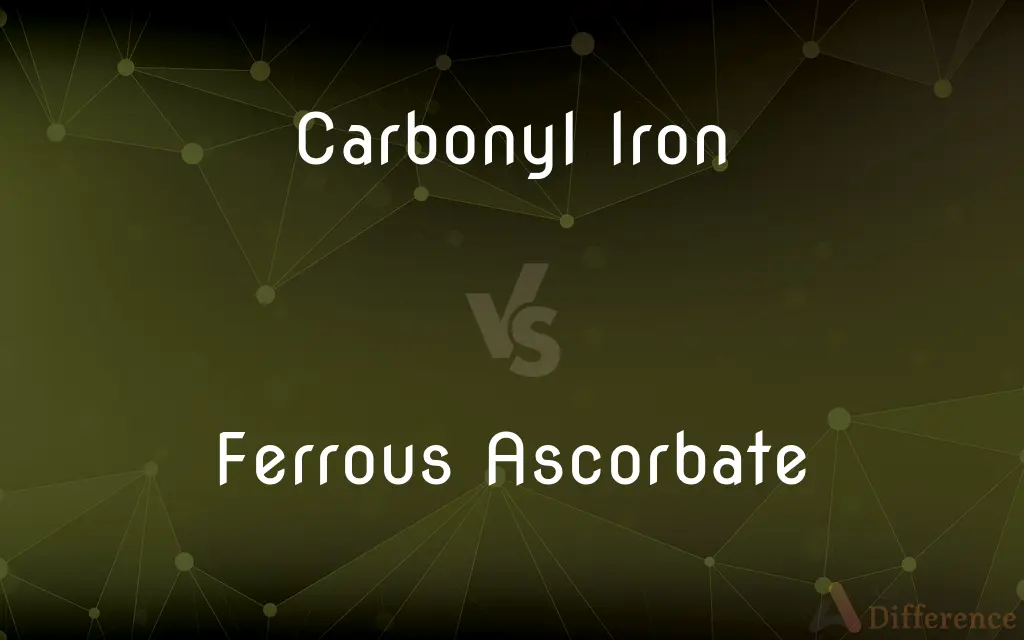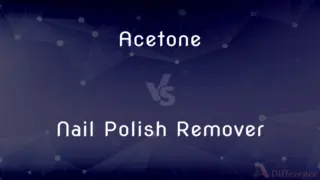Carbonyl Iron vs. Ferrous Ascorbate — What's the Difference?
By Tayyaba Rehman — Published on January 10, 2024
Carbonyl Iron is a pure form of iron used as a dietary supplement, while Ferrous Ascorbate is a combination of iron and vitamin C (ascorbic acid) for enhanced absorption.

Difference Between Carbonyl Iron and Ferrous Ascorbate
Table of Contents
ADVERTISEMENT
Key Differences
Carbonyl Iron is a highly pure and finely divided form of iron, produced by the decomposition of iron pentacarbonyl. It is used as a dietary supplement, especially in treating iron-deficiency anemia, due to its high bioavailability and lower risk of gastrointestinal side effects. Ferrous Ascorbate, on the other hand, is a compound combining iron (in the ferrous form) with ascorbic acid (vitamin C), enhancing the iron's absorption in the body.
The production of Carbonyl Iron involves a chemical process that results in iron particles that are smaller and more easily absorbed than other iron forms. This makes it a preferred choice for individuals who have difficulty tolerating other iron supplements. Ferrous Ascorbate is produced by combining ferrous sulfate and ascorbic acid, offering the dual benefit of iron supplementation and vitamin C, which is known to aid in the absorption of iron.
Carbonyl Iron is often recommended for its high purity and low toxicity, making it suitable for long-term use in managing iron deficiencies. It releases iron slowly, which minimizes common side effects like constipation. Ferrous Ascorbate is advantageous for individuals who need both iron supplementation and an increase in vitamin C intake, such as pregnant women or those with certain dietary deficiencies.
In terms of bioavailability, Carbonyl Iron is absorbed more gradually, reducing the risk of iron overload and providing a steady supply of iron. Ferrous Ascorbate, with the presence of ascorbic acid, ensures a more efficient absorption of iron, especially beneficial in cases of severe iron deficiency where quick replenishment is needed.
From a pharmacological perspective, Carbonyl Iron is often used in controlled-release iron supplements due to its stable and non-reactive nature. Ferrous Ascorbate, meanwhile, is commonly found in combination supplements where immediate iron availability and enhanced absorption are desired.
ADVERTISEMENT
Comparison Chart
Composition
Pure iron particles
Iron combined with ascorbic acid
Production Method
Decomposition of iron pentacarbonyl
Combination of ferrous sulfate and ascorbic acid
Absorption
Slow and gradual
Enhanced by vitamin C
Side Effects
Fewer gastrointestinal issues
Reduced due to vitamin C
Primary Use
Long-term iron supplementation
Quick replenishment of iron and vitamin C
Compare with Definitions
Carbonyl Iron
Low Toxicity: Known for its low toxicity.
Carbonyl Iron is safe for long-term use due to its low toxicity.
Ferrous Ascorbate
Iron with Vitamin C: Combination of iron and ascorbic acid.
Ferrous Ascorbate is effective due to the added vitamin C.
Carbonyl Iron
Controlled-Release Supplements: Used in controlled-release formulations.
Carbonyl Iron is ideal for controlled-release iron supplements.
Ferrous Ascorbate
Enhanced Absorption: Absorbs better due to ascorbic acid.
The ascorbic acid in Ferrous Ascorbate aids in iron absorption.
Carbonyl Iron
Finely Divided Particles: Composed of small iron particles.
The small particle size of Carbonyl Iron enhances its absorption.
Ferrous Ascorbate
Pregnancy Supplement: Often recommended during pregnancy.
Pregnant women are frequently advised to take Ferrous Ascorbate.
Carbonyl Iron
Slow Release: Releases iron slowly in the body.
The slow release of Carbonyl Iron prevents iron overload.
Ferrous Ascorbate
Anemia Treatment: Used to treat iron-deficiency anemia.
Ferrous Ascorbate is prescribed for rapid correction of anemia.
Carbonyl Iron
Pure Iron Supplement: A highly pure form of iron.
Carbonyl Iron is recommended to minimize gastrointestinal distress.
Ferrous Ascorbate
Dual Benefit: Offers benefits of both iron and vitamin C.
Ferrous Ascorbate supplements iron and boosts immunity.
Common Curiosities
Should Ferrous Ascorbate be taken with food?
It can be taken with or without food, but some may find it easier to digest with food.
Are there any allergenic concerns with Carbonyl Iron?
It's generally well-tolerated, but those with iron allergies should avoid it.
How much Carbonyl Iron can be taken daily?
Dosage varies; it's best to follow a healthcare provider's recommendation.
Who should take Carbonyl Iron?
It's ideal for people who need iron supplementation and have sensitive stomachs.
Is Carbonyl Iron absorbed better than other iron forms?
Its small particle size often allows for better absorption.
Can Ferrous Ascorbate improve immunity?
Yes, the vitamin C in it can boost immune function.
Can Ferrous Ascorbate cause stomach upset?
It's less likely to cause gastrointestinal issues compared to other iron forms.
Are there any food interactions with Ferrous Ascorbate?
It should be taken separately from foods that inhibit iron absorption, like tea or coffee.
Can Carbonyl Iron treat severe anemia?
It can be used, but severe anemia might require more immediate forms of iron.
Is Ferrous Ascorbate safe during pregnancy?
Yes, it's often recommended due to its efficacy and safety profile.
Is Carbonyl Iron suitable for children?
Yes, in appropriate doses as prescribed by a pediatrician.
Can Carbonyl Iron be taken with other supplements?
Yes, but it's best to space out the intake of other mineral supplements.
Does Ferrous Ascorbate interact with other medications?
It can, so it's important to discuss with a healthcare provider.
How long does it take for Ferrous Ascorbate to work?
Improvement in anemia symptoms can be seen in a few weeks.
Can Carbonyl Iron cause constipation?
It's less likely to cause constipation compared to other iron supplements.
Share Your Discovery

Previous Comparison
Acetone vs. Nail Polish Remover
Next Comparison
Certificate Holder vs. Additionally InsuredAuthor Spotlight
Written by
Tayyaba RehmanTayyaba Rehman is a distinguished writer, currently serving as a primary contributor to askdifference.com. As a researcher in semantics and etymology, Tayyaba's passion for the complexity of languages and their distinctions has found a perfect home on the platform. Tayyaba delves into the intricacies of language, distinguishing between commonly confused words and phrases, thereby providing clarity for readers worldwide.












































